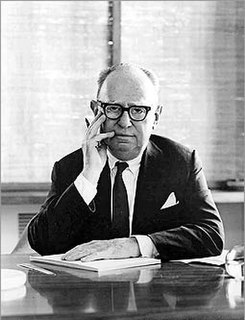A Quote by Sinclair Lewis
Advertising is a valuable economic factor because it is the cheapest way of selling goods, particularly if the goods are worthless.
Quote Topics
Related Quotes
What we're talking about is the price of goods, all goods, in terms of money. That has nothing to do with unemployment, except for the fact that you get fewer goods. And when you have more money and fewer goods, the amount of dollars per good goes up. It goes up because there are fewer goods and it goes up because there is more money.
Three sorts of goods, Aristotle specified, contribute to happiness: goods of the soul, including moral and intellectual virtues and education; bodily goods, such as strength, good health, beauty, and sound senses; and external goods, such as wealth, friends, good birth, good children, good heredity, good reputation and the like.
Don Draper-style advertising is really only available to the biggest brands out there. It's only commodity goods that use those kind of messages because they have to differentiate goods that are really hard to differentiate between - Shell gasoline versus Exxon, Coke versus Pepsi, Sprint versus T-Mobile, it's all the same thing!
[Freedom] is the greatest of political goods. I do not say freedom is the greatest of all goods: the best things come from within they are such things as creative art, and love, and thought. Such things can be helped or hindered by political conditions, but not actually produced by them; and freedom is, both in itself and in its relation to these other goods the best thing that political and economic conditions can secure.
The disciple of Jesus gives up all he has, all his goods, because he has found in him the greatest Good from which every other good receives its full value and meaning: family bonds, other relationships, work, cultural and economic goods and so on... The Christian detaches himself from everything and rediscovers all of it in the logic of the Gospel, the logic of love and service.
I have read a great deal of economic theory for over 50 years now, but have found only one economic "law" to which I can find NO exceptions: Where the State prevents a free market, by banning any form of goods or services, consumer demand will create a black market for those goods or services, at vastly higher prices. Can YOU think of a single exception to this law?
Desire is insatiable not because the goods of the world are too few, too uniform, or too bland. Desire burns through the goods of the world, even though these goods are not false or intrinsically unsatisfactory.... Desire shatters the economy of things; it disputes the tyranny of objects. IT longs for the great emptiness, which is beauty and love without limitation.
I am not interested in dry economic socialism. We are fighting against misery, but we are also fighting against alienation. One of the fundamental objectives of Marxism is to remove interest, the factor of individual interest, and gain, from people's psychological motivations. Marx was preoccupied both with economic factors and with their repercussions on the spirit. If communism isn't interested in this too, it may be a method of distributing goods, but it will never be a revolutionary way of life.
Capitalism improves the quality of life for the working class not just because it leads to improved wages but also because it produces new, better, and cheaper goods.... Indeed, with capitalism, the emphasis shifted to producing goods as cheaply as possible for the masses--the working class--whereas artisans had previously produced their goods and wares mostly for the aristocracy. Under capitalism every business wants to cater to the masses, for that is where the money is.





































